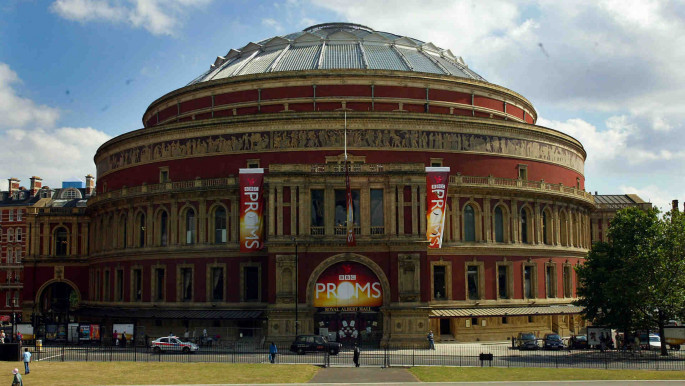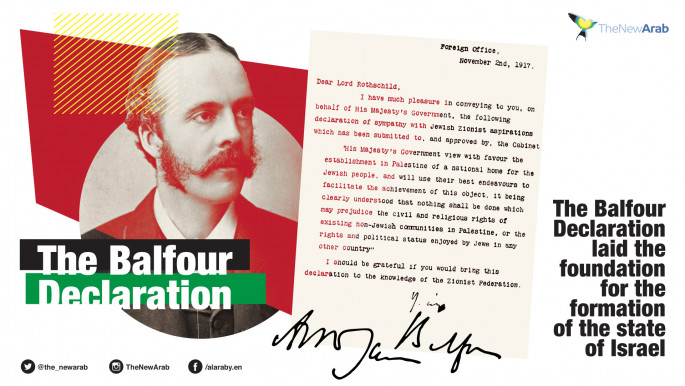
Balfour centenary is being used for propaganda not peace
In the UK, plans are underway to celebrate the centenary of the Balfour Declaration. Calls for a government apology are also being made.
The battle is not just between governments over land, but over telling the truth of Palestinian dispossession and maintaining the lie of Israeli victimhood.
In November 1917, the then Foreign Secretary Lord Arthur Balfour promised that Britain - the colonists of Palestine - would "view with favour the establishment in Palestine of a National Home for the Jewish people".
This was one of two central tenets of the Balfour Declaration, the document that was the catalyst for the creation of Israel, and the accompanying commencement of al Nakba (the catastrophe) for the Palestinians, which continues to this day.
The handing over of a state by Britain to alien third parties was underpinned by the second main tenet of the Declaration: That nothing would be done "which may prejudice the civil and religious rights of existing non-Jewish communities in Palestine". This was a lie: Britain walked away as Jewish terrorists ethnically cleansed the Palestinians, took control of their lives and created a huge, ongoing refugee crisis.
Despite the horrors perpetrated against the Palestinians over a century, British establishment figures have been lining up to ingratiate themselves to Israel and the Balfour celebration.
 |
The crimes committed against the Palestinians do not feature in the celebrations. This amounts to censorship by omission |  |
The crimes committed against the Palestinians do not feature in the celebrations. This amounts to censorship by omission, another falsehood that requires reframing: The Nakba is no historical event, but is ongoing and based on the same goals of dispossession and dominance now as during its preparation in 1917.
| Read more: The Nakba: 69 years old and still destroying lives | |
The propaganda machine is working so effectively for Israel that it is undermining both an opportunity for serious discussion about achieving peace, and overriding the voices of those who genuinely wish to celebrate the centenary but who would not want the occasion to be used for political gain.
UK politicians
In his 2014 book, The Churchill Factor, Foreign Secretary Boris Johnson called the Balfour Declaration "bizarre", "tragicomically incoherent" and "an exquisite piece of Foreign Office fudgerama".
 |
|
| London's Albert Hall where the Balfour 100 celebration is set to take place this November [Getty] |
With the centenary looming, Johnson now refers to the Declaration as "a great thing" that "reflected a great tide of history". Meanwhile, Prime Minister Theresa May has said she intends to celebrate the Balfour centenary with "pride".
The grovelling of the UK's two principal foreign policy interlocutors reflects the passing of a century that has seen the Israel lobby cultivate and perfect its ability to shape both the policy positions of powerful politicians, and the parameters of political debate on the issues.
The Palestinian solidarity movement cannot match the strength of the Israel lobby in this regard. Nevertheless, the Palestinian Return Centre (PRC) heads up a parallel campaign calling for Britain to apologise for the Balfour Declaration. This has been decried as "antisemitic" by the Jewish Leadership Council - another lie - and the battle lines, so familiar to campaigners on both sides, have been drawn.
Competing lobbies
The Balfour Apology Campaign seeks "to impact all sections of society through working with politicians, MPs, media, NGOs, charities, students and members of the public to raise the profile of the campaign".
The campaign's online petition attracted fewer than 14,000 signatures, with 100,000 required to secure a parliamentary debate. The numbers are indicative the relatively weakerPalestine solidarity movement in the UK.
| Read more: De-Jeremy-ising Labour's Israel line, shadow Brexit secretary shuns BDS | |
The Israel lobby is much more effective at projecting power. A slick pro-Israel group, Balfour 100, is promoting a major Balfour centenary celebration at the Royal Albert Hall in London entitled "Partners In This Great Enterprise", an Evangelical Christian celebration of "the history of God's work through the Balfour Declaration".
 |
|
Balfour 100 has a steering committee of 23 British Jewish and pro-Israel groups, including the British Board of Deputies and the Israeli embassy in London. It has numerous subcommittees, everything from education and communications to dinner arrangements. The steering committee is chaired by Lord Kestenbaum on behalf of the Rothschild Foundation, which claims to support "charitable initiatives".
Balfour 100 claims that its website "provides authoritative, historical and accurate details about the Balfour Declaration". This is charitable indeed to whoever undertook the research, and the claim of credibility does not stand up to scrutiny: The Balfour 100 account of events fails to mention the infamous massacre of Palestinians at Deir Yassin and the phrase "ethnic cleansing" does not appear.
 |
The Balfour centenary could be used as a tool for promoting peace |  |
Allied to this, Balfour 100 pushes the David versus Goliath myth of the creation of Israel on its modern audience: "The highly motivated Jewish forces successfully pushed back the Arab onslaught". This re-writing of history represents a complacency and conceit on behalf of the Israel lobby.
The Balfour centenary could be used as a tool for promoting peace by influential figures who must be aware that progress in the Middle East will come through negotiations and dialogue based on acknowledgement of historic and ongoing crimes.
In addition to endorsements from the highest level British political figures and the Albert Hall event, there is a planned lecture by Britain's famous historian, Simon Schama, and plans for "Balfour Shabbat" on the 4 November, with synagogues across the country hosting celebrations.
Pietro Stefanini, PRC's Researcher and Advocacy Coordinator told The New Arab that Balfour 100 is "trying to make the case for celebrations by manipulating the history of Balfour and claiming to speak on behalf of British Jews while ignoring the significant portion of anti-Zionist British Jews who do not support any celebration".
Election
The Balfour Apology Campaign however, does not have the same prestige and power at its command. The result of the imbalance between it and the Israel lobby was reflected in a 2016 Foreign Office statement: "The Balfour Declaration was a historic statement and one that the UK Government will not be apologising for".
 |
Corbyn's approach takes the need for truth as a starting point for peace |  |
Of course, the Balfour plans could be affected by the prevailing instability after the general election. The Apology Campaign will be hoping that Labour will soon be in a position to take power, should the fragile Conservative-Democratic Unionist Party (DUP) majority collapse.
Party leader Jeremy Corbyn has already stated his approval of the idea of an apology, and he would represent an historic break for a party so inured in support for Israeli policies.
In 1944, a statement from the Labour Party on Palestine read: "Let the Arabs be encouraged to move out as the Jews move in." In 1948, the Labour government of Clement Atlee, so progressive domestically, announced that it could do nothing to stop the transfer of money from Britain to Jewish groups in Palestine who would soon carry out the ethnic cleansing of the native population.
 |
The repercussions of Balfour are as acute now as they ever have been |  |
Fast forward to 2001 and Tony Blair's Labour government granted 90 arms exports licences to Israel for "defensive" use - to kill Palestinians and Lebanese. At a meeting that I attended in 2009 in the aftermath of the massacre in Gaza (Operation Cast Lead), the then Labour Foreign Secretary David Miliband defended his arms sales to Israel in the most wretched way: By saying that if Britain stopped profiting, some other country would. Labour's support has been continuous, despite Israel being an official human rights priority country for the Foreign Office.
Corbyn would turn the tide of blind Labour support for Israel. A Conservative victory would have seen May's government consolidate power. Despite her epic failure, her DUP partners are staunchly pro-Israel and an invitation to Binyamin Netanyahu to visit London to celebrate Balfour has been sent.
Corbyn's approach takes the need for truth as a starting point for peace, an approach that would look to guarantee Israeli security while addressing the rights and needs of all Palestinians. The May-DUP point of departure is lies, denial and Israeli propaganda.
In his book "A People's History of The United States" the American historian Howard Zinn wrote scathingly of mainstream historians: "One can lie outright about the past. Or one can omit facts which might lead to unacceptable conclusions".
With Balfour 100 and others, a combination of these two tactics is being employed. Zinn chose instead to explain history from the point of view of the victims of power. As the centenary draws nearer, it will be imperative to tell the story of the Balfour Declaration from the point of view of its victims.
Not because of an intellectual imperative, or even to set the record straight about the past, but because the repercussions of Balfour are as acute now as they ever have been.
Tom Charles is a London-based writer, editor and literary agent. He previously worked in the UK parliament, including as a lobbyist for Palestinian rights. He has contributed to Jadaliyya and the Journal of Palestinian Refugee Studies.
Follow him on Twitter: @tomhcharles
Opinions expressed in this article remain those of the author and do not necessarily represent those of The New Arab, its editorial board or staff.





 Follow the Middle East's top stories in English at The New Arab on Google News
Follow the Middle East's top stories in English at The New Arab on Google News


